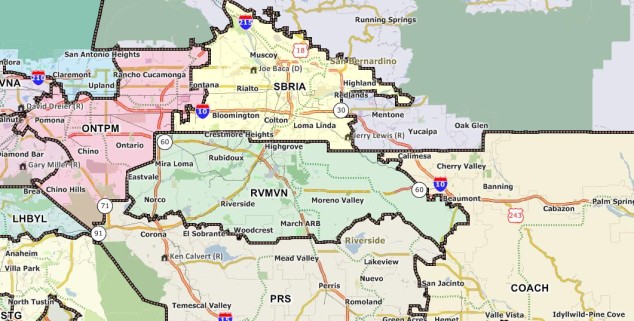News
High Court upholds redistricting panel
 Congressional districts in the Inland Empire, approved by California's redistricting commission in 2011. (Map: Ballotpedia)
Congressional districts in the Inland Empire, approved by California's redistricting commission in 2011. (Map: Ballotpedia)That whooshing sound you hear is the sigh of relief from California political reformers.
The U.S. Supreme Court today rejected an attempt by the Arizona Legislature to dismantle that state’s voter-approved, independent commission that draws the political boundaries for legislative and congressional districts. Arizona lawmakers had argued that the commission – which California used as a model for its own redistricting commission — was unconstitutional because it cut them out of the map-drawing process.
California said a high court ruling against the Arizona panel would put the California Citizens Redistricting Commission at risk.
The court in a 5-4 decision with its most conservative members dissenting, said the state had the right to set up an independent commission to draw the congressional boundaries, a decision that means the California commission’s similar authority will stay intact.
Arizona voters sought to restore “the core principle of republican government,” the decision noted.
Justice Anthony Kennedy, who proved a swing vote on the same sex marriage case, sided with the majority.
California’s commission, also approved by voters, makes the maps for the Golden State’s 53 congressional districts, as well as the Legislature and Board of Equalization. It’s fate was tied to the Arizona case.
California, which sided with Arizona in the case, patterned its own voter-approved, independent redistricting commission after the Arizona panel and had formally intervened in the landmark case.
California’s commission makes the maps for 177 seats — 53 congressional districts, as well as the 120-member Legislature and four-member Board of Equalization.
The California commission has five Democrats, five Republicans, and four commissioners from neither major party. The panel, created after decades in which political leaders carved up districts, draws maps for 177 districts – 120 for the Legislature, 53 for Congress and four for the Board of Equalization.
California, in a friend-of-the-court brief to the Supreme Court earlier this year, declared its support for the Arizona commission, saying a high court ruling against the Arizona panel would put the California Citizens Redistricting Commission at risk.
“The people’s power to legislate by initiative and referendum is guaranteed in both California’s and Arizona’s Constitutions, and the power to legislate by initiative and referendum has been recognized by this Court as demonstrating devotion to democracy and innovation,” the California commission said.
California voters favored their independent commission twice — first to create it at all, in 2008, then to expand its authority in 2010 to include drawing the boundaries for the nation’s largest congressional delegation. An attempt by political leaders to repeal the commission failed.
For decades, the Legislature drew state and congressional districts, but political reformers called for an independent commission to handle the map making, and voters agreed. Three dozen states have redistricting commissions that are structured in a variety of ways, and a half dozen states have panels that are regarded as independent – Washington, Alaska, Arizona, Idaho, Montana and California.
The Arizona Independent Redistricting Commission, created by voters in 2000, said it has the lawful authority to draw state and federal districts, and that Congress “decided a century ago that redistricting should be done pursuant to state law.”
But the Arizona Legislature, along with the National Conference of State Legislatures, challenged the commission’s authority, saying it unconstitutionally usurps legislative power and that state lawmakers have been excluded entirely from the process.
The five-member Arizona commission, along partisan lines, had approved 30 legislative and nine congressional new districts in 2011 and was promptly sued by the Legislature.
Federal law requires political political districts to be redrawn once a decade to reflect the population and demographic shifts reported by the census.
Want to see more stories like this? Sign up for The Roundup, the free daily newsletter about California politics from the editors of Capitol Weekly. Stay up to date on the news you need to know.
Sign up below, then look for a confirmation email in your inbox.

Leave a Reply